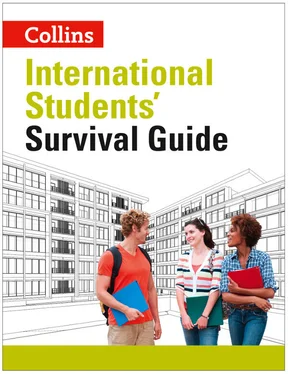About the Publisher
Introduction
Congratulations!
You’ve been accepted onto a college/university program in an English-speaking country! This is great news. You’re probably full of excitement and at the same time possibly a little anxious. This may be your first time away from home. It’s also likely that you’re changing from studying at a high school to undergraduate or graduate study which requires new skills. You may have lots of questions:
What will it be like?
What do I need to know?
How should I prepare myself?
What should I do or say?
How do I make the most out of my time studying abroad?
The information provided here will help you to make the move from your home country (where you live now) to the host country (where you’re going) as smooth as possible.
This book has been written to provide advice to anyone going to study (or already studying) in an English-speaking country. In this book, you’re called “international students” and the students who are from the country you’re studying in are called “home students” or “local students.” It’s likely that there are lots of other international students at the college/university. Some of these will be non-native speakers like yourself and others will be native speakers from other English-speaking countries. Some of the advice in this book helps you to make friends with other students, either other international students or home students.
If you look at the contents page, you’ll notice that the 20 chapters in this book are divided into four main sections that cover how to prepare before you leave, what to expect from college/university life, what it’s like studying in another country, and finally, how to prepare for the end of the semester/term or going home. Many people find going home as much of a change as arriving in a new country so the information in this section is important too.
The language in this book has been graded so that it’s easier for learners of English to understand. If there’s a difficult word in the text, a definition of the word is provided in a box under the text. The definitions are taken from Collins COBUILD Advanced Dictionary which is a dictionary that is specifically written for learners of English. This dictionary may be useful to you while you’re studying abroad. You can access this dictionary for free at www.collinsdictionary.com/cobuild
The book also contains links to other useful websites to offer further help. That’s because the aim of this book is to act as your companion throughout your studies. Collins also has other resources that you might find useful. You can find these by going to www.collinselt.com.
The authors who wrote this book are based in the US, the UK, and Australia so the book contains general information on studying abroad and specific information on studying in these three countries. Key terms used at college/university in the US, the UK, and Australia are included in this book.
Here are some examples of some of the key terms:
| US |
UK |
Australia |
| college |
university |
university |
| class |
lecture |
lecture |
| diploma |
graduation/degree certificate |
graduation/degree certificate |
| dorm/dormitory |
halls/halls ofresidence |
studentaccommodation |
| faculty |
staff |
staff |
| major |
course |
course |
| professor |
lecturer |
lecturer |
| semester |
term |
term |
| vacation |
holiday |
holiday |
Make the most of your time abroad
Between them the four authors have over 60 years’ experience working with international university students. They have watched many international students achieve success when studying abroad and they wanted to share their experiences and knowledge with you in this book so you can make the most out of the wonderful opportunity of studying abroad.
Jenny Siklós, Madison English as a Second Language School, Wisconsin, USA
Dr. Fiona Swee-Lin Price, Tamago Consulting: The intercultural education specialists, Melbourne, Australia
Els Van Geyte, University of Birmingham, UK
Anneli Williams, University of Glasgow, UK
So you’ve decided to study abroad! Studying in another country is more than just a degree: it’s an experience. You won’t just be going to classes, you’ll be adapting to a new culture, new people, and new places. Make sure your experience is as positive as possible by finding out as much as you can. The more research you do before you leave, the easier life will be when you arrive. Here are some things you can do before you go.
Talk to other people who have studied in the same institution or town.
Read the website of the institution where you will be studying. Some institutions have webpages with information for international students.
Read about the town where you will live, not just the country in general.
Don’t always assume what you see on TV shows or read in news reports is 100% correct. The job of TV and news reports is making a good story about a country, not necessarily informing people about everyday life there.
Don’t assume that all the people in countries like the UK, US, and Australia are white and English-speaking. These countries have immigrants from all over the world.
Preparing for your first week
The first week in your study country will be both exciting and overwhelming. There will be many things you need to organize: finding your way to and around campus, registering for your course or classes, and making decisions about your studies and accommodation. Here are useful terms to know when you arrive.
Most institutions provide information about the course and campus in the week before classes start or the first week of the semester/term. This week is called Orientation Week, Welcome Week, Freshman Week, or Freshers’ Week.
Registration Day (or Enrollment Day) is when students confirm what they are studying and get their ID card. This may happen on campus on a specific day or online. Find out what documents you need for Registration Day and bring them with you.
Most majors/courses are made up of several units/classes each taught by a different professor or tutor. In the UK the term “lecturer” is also used.
Pre-requisite:A pre-requisite is a unit/class you must take before you can study something else.
Required/Compulsory:A required class is a class which every student in the major must study.
Electives/Elective units:An elective is a class which you can choose to study. Students must study all required classes and a certain number of electives of their choice.
In the US, you’ll have a combination of required classes and electives. Required classes may be part of your major, or part of general requirements for a BA, for example. Even if you’re an English major, for example, you’ll still need to take a certain number of science classes.
Читать дальше












